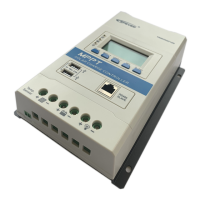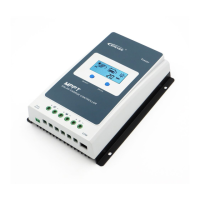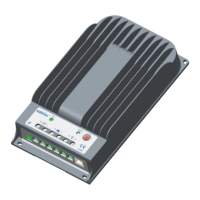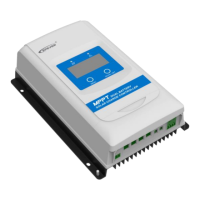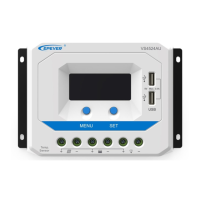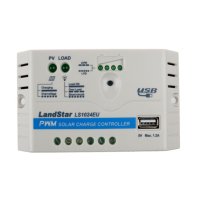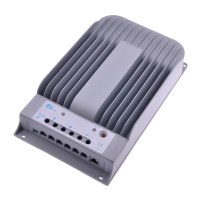Copyright
©
2021 SolarV GmbH All rights reserved
4. Protections, Troubleshooting and Maintenance
4.1.Protection
When the charging current or power of the PV array exceeds the controller’s rated
current or power, it will be charged at the rated current orpower.
NOTE: When the PV modules are in series, ensure that the open-circuit voltage of
the PV array does not exceed the "maximum PV
open-circuit voltage" rating. Otherwise the controller may be damaged.
When not in PV charging state, the controller will not be damaged in case of a short-
circuiting in the PV array.
When the polarity of the PV array is reversed, the controller may not be damaged and
can continue to operate normally after the polarity iscorrected.
NOTE: If the PV array is reverse connected to the controller,1.5 times rated
controller power (watts)from the PV array, will damage
the controller.
Prevents the battery from discharging through the PV module at night.
Fully protected against battery reverse polarity; no damage will occur for the
battery. Correct the miswire to resume normal operation.NOTE: Limited to the
characteristic of lithium battery, when the PV connection is correct and
battery connection reversed, the controller will be damaged.
When the battery voltage reaches the over voltage disconnect voltage, it will
automatically stop battery charging to prevent batterydamage caused by
over-charging.
When the battery voltage reaches the low voltage disconnect voltage, it will
automatically stop battery discharging to prevent battery damage caused by over-
discharging. (Any controller connected loads will be disconnected. Loads directly
connected to the battery will not be affected and may continue to discharge the
battery.)
The controller can detect the battery temperature through an external temperature
sensor. The controller stops working when itstemperature exceeds 65 °C and restart
to work when its temperature is below 55 °C.
Lithium Battery
LowTemperature
When the temperature detected by the optional temperature sensor is lower
than the Low Temperature Protection
Threshold(LTPT), the controller will stop charging and discharging automatically. When
the detected temperature is higher than the LTPT, the controller will be working
automatically (The LTPT is 0 °C by default and can be set within the range of 10 ~ -40 °C).
When the load is short circuited (The short circuit current is ≥ 4 times the rated
controller load current), the controller will
automatically cut off the output. If the load reconnects the output automatically
five times (delay of 5s, 10s, 15s, 20s, 25s), it needs to becleared by pressing the
Load button, restarting the controller or switching from Night to the Day
(nighttime > 3 hours).
When the load is overloading (The overload current is ≥ 1.05 times the rated load
current), the controller will automatically cut off
the output. If the load reconnects automatically five times (delay of 5s, 10s, 15s, 20s,
25s), it needs to be cleared by pressing the Load buttonrestarting the controller,
switching from Night to Day (nighttime > 3 hours).
The controller is able to detect the temperature inside the battery. The controller
stops working when its temperature exceeds 85 °C andrestart to work when its
temperature is below 75 °C.
TVS High
Voltage
Transients
The internal circuitry of the controller is designed with Transient Voltage Suppressors
(TVS) which can only protect against high- voltage surge pulses with less energy. If the
controller is to be used in an area with frequent lightning strikes, it is
recommended to install an external surge arrester.
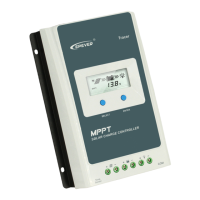
